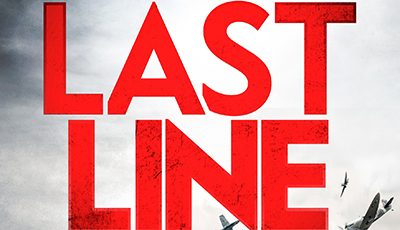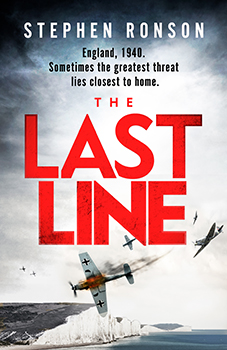

Latest Books The Last Line with Stephen Ronson
The Big Thrill Discusses THE LAST LINE With Stephen Ronson
With Nazi forces sweeping across France, invasion seems imminent. The English Channel has never felt so narrow.
In rural Sussex, war veteran John Cook has been tasked with preparing the resistance effort, should the worst happen.
But even as the foreign threat looms, it’s rumours of a missing child that are troubling Cook. A twelve-year-old girl was evacuated from London and never seen again, and she’s just the tip of the iceberg—countless evacuees haven’t made it to their host families.
As Cook investigates, he uncovers a dark conspiracy that reaches to the highest ranks of society. He will do whatever it takes to make the culprits pay. There are some lines you just don’t cross.
Author Stephen Ronson recently spent time with The Big Thrill to discuss his latest historical thriller, THE LAST LINE.
A novel is such a major undertaking; there’s the writing of it, of course, then you’re spending months and months revising, polishing, and then promoting it. How did you know this was the book you wanted to spend the next couple of years on?
I knew instantly I wanted to escape every day to the Sussex countryside and live in a simplistic world where good triumphs over evil. This was during COVID, during Trump, post-Brexit. I wanted an escape.
Can you pinpoint a moment or incident that sparked the idea for this book?
I was reading James Holland’s excellent new history of WW2, and there was a single line about auxiliary units—teams of men who would lead the fight back in rural England after the anticipated German invasion. Having grown up in the Sussex countryside during the Cold War, wondering where I’d run to when the world ended, this resonated with me. It didn’t hurt that the world was ending at the time, as COVID swept across the world, and we all hunkered down. I knew I wanted to create a hero who wandered the Sussex countryside, righting wrongs, making the world a better place.
Were there any particular books, movies, or songs that were knocking around in your head while you were writing this one?
I have loved Lee Child’s Reacher books since The Killing Floor came out. For years I was the person telling all their friends to look out for these quirky little books about this quirky big hero. I used to wish that airport bookstores stocked them so I could read them on flights. Now Reacher is known across the world, and I still love every new book. My book is consciously a homage to Reacher, and I hope that’s OK with Lee Child!
When you first created your protagonist for this book, did you see an empty space in crime lit that you wanted to fill? What can you share about the inspiration for that character?
Reacher fills his own space so magnificently, that for me to create a similar character certainly wasn’t filling an empty space, but it’s a space that I think has room for more inhabitants! As I wrote, my protagonist John Cook took on his own personality and existence, and early readers have been responding very well to him and the supporting characters.
In addition to a great read, what do you hope readers will take away from this story?
I want readers to feel what it was like in southern England during the summer of 1940, when Nazi panzers had swept practically unopposed across Europe, and were poised on the other side of the English Channel, ready to invade. Now we look back with hindsight and know how things turned out, but at the time, the people of England thought they were next. In that setting, I want readers to take away the fact that so many normal people ‘did their bit,’ in ways big and small, to ‘keep calm and carry on,’ and to prepare to fight back.
What can you share about what you’re working on next?
I’m working on the next John Cook book, and when that’s done I’m keen to get to a country-house murder mystery that’s been bubbling away in the back of my mind. It’s set in an abandoned country house that’s rented out for a film shoot. The first night of filming, the lead actress goes missing, and is later found dead. It’s called The Night Shoot and I can’t wait to write it.
Stephen Ronson grew up in Sussex, and spent a large part of his childhood exploring the woods and fields around Uckfield, many of which were still dotted with reminders of WW2—pill boxes, tank traps, nissen huts, and graffiti left by soldiers awaiting D-Day. He is a passionate student of local history, and when he learnt about Auxiliary Units—groups of men who were instructed to lay low during the predicted Nazi invasion and lead the fight back, he knew he had to write about a Sussex farmer, one with a love of the land, and a natural desire and ability to get the job done. Many of the locations and characters in the John Cook series are inspired by real places and real people. In particular, Stephen was inspired by his grandparents, Eric, Bessie, Peter and Vera, each of whom did their bit on the home front.
Nowadays, Stephen divides his time between Vermont, USA, and Uckfield, East Sussex. When he’s not writing, he can be found renovating his house, or walking the woods and the fields.
To learn more about the author, please visit his website.
THE LAST LINE With Stephen Ronson
- LAST GIRL MISSING with K.L. Murphy - July 25, 2024
- CHILD OF DUST with Yigal Zur - July 25, 2024
- THE RAVENWOOD CONSPIRACY with Michael Siverling - July 19, 2024


